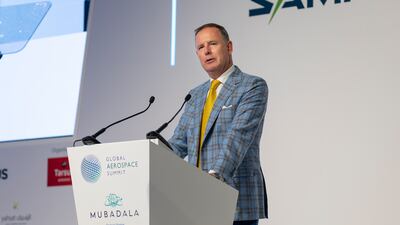Etihad Airways expects to deliver “impressive” results in the first half of 2022 on higher load factors, strong passenger yields, solid cargo business and lower costs, its chief executive said.
Load factors — a measure of how well an airline fills available seats — rose to 77 per cent in May across the route network, compared to 75 per cent in May 2019, Tony Douglas, chief executive of Etihad Aviation Group, told The National on Tuesday on the sidelines of the Global Aerospace Summit in Abu Dhabi.
“It will be a very impressive first-half return and that's driven by the load factors are very high network-wide, the yield or price of the tickets is still holding up, and cargo rates are strong, together with the fact that we've massively reduced our cost base. The equation is frankly almost as simple as that,” Mr Douglas said.
“I am expecting a strong first-half performance.”
Etihad has been engaged in the process of hiring an additional 1,000 employees, from cabin crew to ground staff, over the past three months, Mr Douglas said, pointing to the industry-wide challenge of labour shortages at airlines and airports.
Re-training and certifying aviation workers globally takes time, while some who were furloughed or laid off during the pandemic have moved to other jobs outside the industry, he said.
“If you come into our crew training at the moment, you'll see a class every week that is basically graduating, which is great,” he said.
At the end of 2021, Etihad's total workforce stood at 12,533 employees.
With Covid-related travel restrictions easing worldwide, pent-up air travel demand is finally being unleashed, the International Air Transport Association (Iata) said.
Total traffic in March 2022 — measured in revenue passenger kilometres, or RPKs — was up 76 per cent, compared with March 2021, Iata said in its monthly report. Although that was lower than the 115.9 per cent rise in annual demand in February, “volumes in March were the closest to 2019 pre-pandemic levels, at 41 per cent below”, it said.
The Abu Dhabi-based airline is currently operating three Airbus A350 passenger jets, following the aircraft's maiden flight six weeks ago, and plans to introduce two additional A350s into service by year's end, Mr Douglas said.
The airline will take delivery of another seven A350 wide-bodies in 2025, taking the total number of this jet model to 12, he added.
The airline boss said he is not concerned about upcoming A350 deliveries in light of the surface problems with the jet reported by Qatar Airways.
“The reason why I'm saying we're not [concerned] is that, first of all, the Qatar Airways jets were pretty much within the first batch of aircraft that were getting delivered way back,” Mr Douglas said, noting that Etihad's A350 jets are a more recent batch.
Qatar Airways was the launch customer for the jet, taking delivery of the A350-1000 widebody in 2018.
“If we end up with a paint degradation problem in three or four years time, I think it would be one where we would sit down with Airbus and the paint manufacturers, by which time I would expect that there will be a very simple resolution to it one way or the other,” he said.
“Contractually, we won't be affected because we've got it covered off … we'll just handle it, it's not a big deal as far as I'm concerned.”
The surface paint issue on the A350 is not surprising because new aircraft types often come with initial technical problems, he added.
This is further complicated by the fact that the latest generation of jets are carbon-composite structures.
“What you've got with composite is that it's super strong and super flexible,” he said.
“So, consequently, the paint technology that goes on to composite is completely different than the paint technology that goes on to an aluminium tube or wing.
“The molecular structure and compound of the paint is a different science altogether.
“As a consequence I'm not surprised, in all honesty, that there's been a few challenges.”
Mr Douglas noted that he has no insight into the issue with Qatar Airways' A350 paint problem.
Etihad had previously detected some paint peeling on the composite wing of some of its Boeing 787 jets after three years of operation because of UV rays that were causing the molecular structure of the paint to break down and peel, but the issue was “cosmetic” and was fixed immediately, he said.
Etihad currently has 39 Boeing 787 Dreamliners in the fleet, with another 11 on order, Mr Douglas said.
Boeing has suspended deliveries of its 787 model as it addresses production flaws on the model.
“We're not assuming we'll get them any time soon, which I think is a very safe bet and consequently, what we're equally going to avoid is trying to create any form of false certainty until we've got a more accurate statement from them,” Mr Douglas said when asked about the expected date for resumption of deliveries.
The delivery dates will ultimately be determined following the go-ahead from the US Federal Aviation Authority, he said.
“It would have been great if we would have taken some of the deliveries on the 787s,” he added, pointing to strong “latent” demand for air travel after two years of lockdowns during the pandemic.
“The fact that we have not, it's not mission critical by any stretch of the imagination.”







